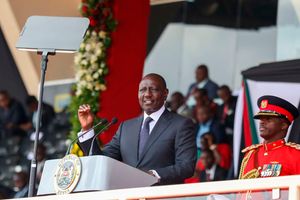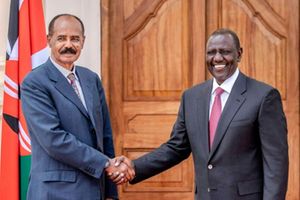Premium
Nations hint at bold safety plans as nuclear security talks end in Nairobi

International Atomic Energy Agency expert Olga Makarovska (left) with Kenya Nuclear Regulatory Authority Deputy Directors Isaac Mundia and Michael Atogo (right) at the regional nuclear safety talks that ended in Nairobi on June 23, 2023.
A regional meeting in Nairobi has resulted in new action plans from 22 African countries on the safe and secure use of nuclear technologies.
The forum, which began on Monday and ended Friday, highlighted the urgent need for investment in technology and the acquisition of knowledge critical to effective regulation.
At the top of the list of commitments made by countries at the end of the forum was the political commitment of governments to comply with the International Atomic Energy Agency's (IAEA) safety guidelines and code of conduct.
The code's provisions on the security of radioactive sources have been strengthened in light of the events of 11 September in the United States. Some of its provisions relate to import and export controls of radioactive and nuclear materials.
The regional meeting agreed that the nations of the continent should "burn the midnight oil" to support the IAEA's global efforts to enhance the security of radioactive sources, including disused ones.
Kenya vowed to uphold the code and maintain cooperation. "We have done well in complying with the code and we are working on the political commitment," said Edward Mayaka, Director of Partnerships and Public Awareness at the Kenya Nuclear Regulatory Authority (KNRA).
"We are working on our political commitment to the IAEA code and hope to deposit the necessary legal documents by December this year," said Melody Mwema of Zambia's Radiation Protection Authority.
For Zimbabwe, the meeting heard that an amendment Bill was before Parliament which, if passed, would tighten regulatory controls and ensure efficient waste management. What we need now is to strengthen stakeholder engagement as we move forward," said Ms Wongai Mavurayi, representing the Harare-based Radiation Protection Authority.
IAEA expert Olga Makarovska urged countries to strengthen technical cooperation among themselves.
"We expect you to actively exchange ideas in a way that will help build competence among regulators," she said.
The five-day meeting also discussed the protection of patients from radiation sources, licensing and inspection, enforcement for the safety and security of radiation sources, and import and export of radiation sources.
Key challenges identified by regulators include political interference in decision-making and financial constraints. They pointed out that in most countries the number of technical staff in the regulatory bodies was not commensurate with the nature of the work and the number of installations.
Mr Mayaka gave the closing address on behalf of KNRA Director General James Keter, who on Monday implored nations to work together towards the protection of lives and property.
"We will move with speed and ensure speedy harmonisation of all relevant policies and laws. We are all here to protect lives and property in our work," Mr Keter said.
Mr Keter had urged countries to address gaps that could lead to threats of misuse of nuclear and radioactive materials. "Countries should speak the same language - that of protecting people so that the inherent risks do not overwhelm us."
Countries participating in the talks include Libya, Algeria, Ethiopia, Ghana, Lesotho, Nigeria, Senegal, Zambia, Benin and Cameroon, among others.





